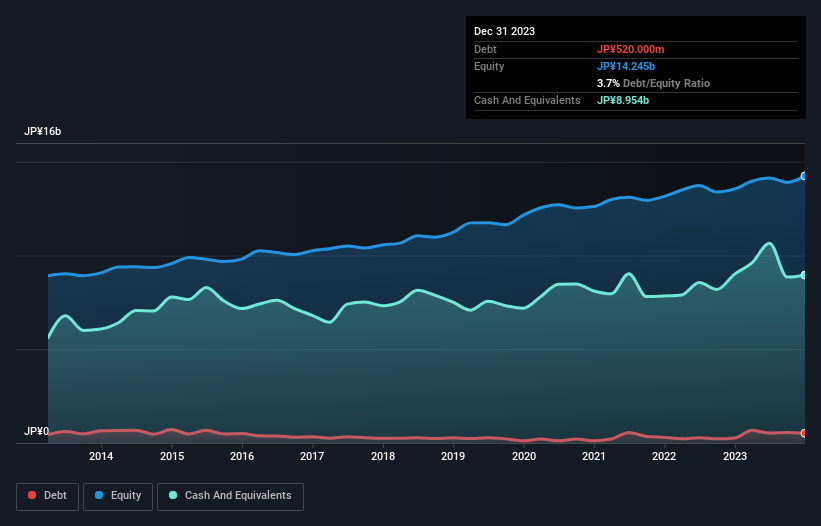Legendary fund manager Li Lu (who Charlie Munger backed) once said, 'The biggest investment risk is not the volatility of prices, but whether you will suffer a permanent loss of capital.' So it seems the smart money knows that debt - which is usually involved in bankruptcies - is a very important factor, when you assess how risky a company is. As with many other companies Computer Institute of Japan, Ltd. (TSE:4826) makes use of debt. But is this debt a concern to shareholders?
Why Does Debt Bring Risk?
Debt is a tool to help businesses grow, but if a business is incapable of paying off its lenders, then it exists at their mercy. If things get really bad, the lenders can take control of the business. While that is not too common, we often do see indebted companies permanently diluting shareholders because lenders force them to raise capital at a distressed price. Of course, the upside of debt is that it often represents cheap capital, especially when it replaces dilution in a company with the ability to reinvest at high rates of return. The first step when considering a company's debt levels is to consider its cash and debt together.
View our latest analysis for Computer Institute of Japan
What Is Computer Institute of Japan's Net Debt?
The image below, which you can click on for greater detail, shows that at December 2023 Computer Institute of Japan had debt of JP¥520.0m, up from JP¥270.0m in one year. However, its balance sheet shows it holds JP¥8.95b in cash, so it actually has JP¥8.43b net cash.

How Strong Is Computer Institute of Japan's Balance Sheet?
The latest balance sheet data shows that Computer Institute of Japan had liabilities of JP¥3.87b due within a year, and liabilities of JP¥63.0m falling due after that. Offsetting these obligations, it had cash of JP¥8.95b as well as receivables valued at JP¥3.24b due within 12 months. So it can boast JP¥8.27b more liquid assets than total liabilities.
This surplus suggests that Computer Institute of Japan is using debt in a way that is appears to be both safe and conservative. Because it has plenty of assets, it is unlikely to have trouble with its lenders. Succinctly put, Computer Institute of Japan boasts net cash, so it's fair to say it does not have a heavy debt load!
The good news is that Computer Institute of Japan has increased its EBIT by 5.1% over twelve months, which should ease any concerns about debt repayment. There's no doubt that we learn most about debt from the balance sheet. But you can't view debt in total isolation; since Computer Institute of Japan will need earnings to service that debt. So when considering debt, it's definitely worth looking at the earnings trend. Click here for an interactive snapshot.
Finally, a company can only pay off debt with cold hard cash, not accounting profits. Computer Institute of Japan may have net cash on the balance sheet, but it is still interesting to look at how well the business converts its earnings before interest and tax (EBIT) to free cash flow, because that will influence both its need for, and its capacity to manage debt. Over the most recent three years, Computer Institute of Japan recorded free cash flow worth 65% of its EBIT, which is around normal, given free cash flow excludes interest and tax. This cold hard cash means it can reduce its debt when it wants to.
Summing Up
While we empathize with investors who find debt concerning, you should keep in mind that Computer Institute of Japan has net cash of JP¥8.43b, as well as more liquid assets than liabilities. So is Computer Institute of Japan's debt a risk? It doesn't seem so to us. The balance sheet is clearly the area to focus on when you are analysing debt. However, not all investment risk resides within the balance sheet - far from it. For example, we've discovered 2 warning signs for Computer Institute of Japan (1 is a bit concerning!) that you should be aware of before investing here.
When all is said and done, sometimes its easier to focus on companies that don't even need debt. Readers can access a list of growth stocks with zero net debt 100% free, right now.
New: AI Stock Screener & Alerts
Our new AI Stock Screener scans the market every day to uncover opportunities.
• Dividend Powerhouses (3%+ Yield)
• Undervalued Small Caps with Insider Buying
• High growth Tech and AI Companies
Or build your own from over 50 metrics.
Have feedback on this article? Concerned about the content? Get in touch with us directly. Alternatively, email editorial-team (at) simplywallst.com.
This article by Simply Wall St is general in nature. We provide commentary based on historical data and analyst forecasts only using an unbiased methodology and our articles are not intended to be financial advice. It does not constitute a recommendation to buy or sell any stock, and does not take account of your objectives, or your financial situation. We aim to bring you long-term focused analysis driven by fundamental data. Note that our analysis may not factor in the latest price-sensitive company announcements or qualitative material. Simply Wall St has no position in any stocks mentioned.
About TSE:4826
Computer Institute of Japan
Provides system development and related services in Japan.
Solid track record with excellent balance sheet and pays a dividend.
Market Insights
Community Narratives



